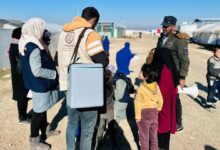ICC issues arrest warrants for Netanyahu, Gallant and Hamas commander
 The UN-backed International Criminal Court (ICC) on Thursday issued arrest warrants for Israeli Prime Minister Benjamin Netanyahu and former defence minister Yoav Gallant, together with a former Hamas commander, citing allegations of war crimes and crimes against humanity.
The UN-backed International Criminal Court (ICC) on Thursday issued arrest warrants for Israeli Prime Minister Benjamin Netanyahu and former defence minister Yoav Gallant, together with a former Hamas commander, citing allegations of war crimes and crimes against humanity.
Judges on the ICC said there were reasonable grounds that the three men bore “criminal responsibility” for the alleged crimes committed “from at least 8 October 2023 until at least 20 May 2024” – the day the Prosecution filed the applications for warrants of arrest – the Court said in a press release.
Tweet URL
“With regard to the crimes, the [Court’s Pre-Trial Chamber I] found reasonable grounds to believe that Mr. Netanyahu…and Mr. Gallant…bear criminal responsibility for the following crimes as co-perpetrators for committing the acts jointly with others: the war crime of starvation as a method of warfare; and the crimes against humanity of murder, persecution, and other inhumane acts,” said the ICC.
The arrest warrants followed the ICC’s rejection of Israel’s challenges to the Court’s jurisdiction.
Warrant against Hamas commander
The warrant for Hamas military commander Mohammed Deif also alleges crimes against humanity and war crimes, although Israel has said that he was killed in an air strike in Gaza in July.
“The Chamber found reasonable grounds to believe that Mr. Deif … is responsible for the crimes against humanity of murder; extermination; torture; and rape and other form of sexual violence; as well as the war crimes of murder, cruel treatment, torture; taking hostages; outrages upon personal dignity; and rape and other form of sexual violence.”
Investigations continue
The ICC said it was continuing to gather information regarding the reported death of Mr. Deif. As of 15 November, his status is unknown.
“The Prosecution also noted that it continues to investigate the crimes in the ongoing conflict and envisions that further applications for warrants of arrest will be submitted,” the release added.
The Prosecution had initially filed applications for warrants of arrest for two other senior Hamas leaders, Ismail Haniyeh and Yahya Sinwar. However, these were withdrawn following confirmations of their deaths.
‘In the interest of victims and their families’
The three arrest warrants are classified as “secret” to protect witnesses and to safeguard the conduct of investigations.
However, the Chamber decided to release the information due to the continuation of the war and likely violations of international law that are continuing in the Occupied Palestinian Territory, in particular the fact hostages continue to be held in Gaza.
“The Chamber considers it is also in the interest of victims and their families to be aware of the warrant’s existence,” the Court said.
Prosecutor calls for focus on victims
In a statement issued later on Thursday the ICC Prosecutor Karim Khan said that “our collective mind and focus should be on the victims of international crimes in Israel and in the State of Palestine.”
He said during meetings with the victims and families of hostages taken on 7 October “and with victims from Gaza who have lost so many loved ones, I have underlined that the law is there for all, that its role is to vindicate the rights of all persons.”
He stressed that the warrants had been sought in May following an independent investigation, and on the basis of objective, verifiable evidence, vetted through a forensic process.
“I appeal to all States Parties to live up to their commitment to the Rome Statute by respecting and complying with these judicial orders,” said Mr. Khan. “We count on their cooperation in this situation, as with all other situations under the Court’s jurisdiction. We also welcome collaboration with non-States Parties in working towards accountability and upholding international law.”
About the ICC
The International Criminal Court (ICC) is not part of the United Nations but they have a cooperative and complementary relationship.
The ICC is an independent judicial body established by the Rome Statute, which was adopted in 1998 and came into force in 2002.
It was established to address serious international crimes and ensure accountability when national justice systems are unable or unwilling to act.



